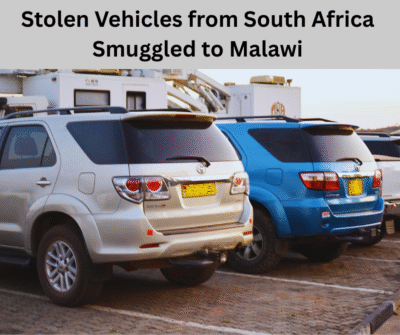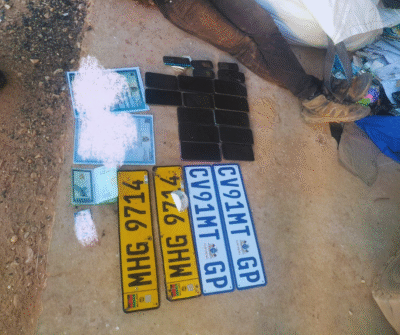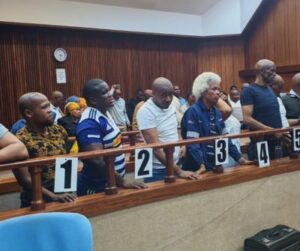By Missing Person South Africa
South Africa is facing a silent crisis — a wave of vehicle thefts that seem to vanish without a trace. While many believe stolen cars are driven through the bush or smuggled via back roads, new information suggests a much more sophisticated syndicate is at play, especially in KwaZulu-Natal.
A network involving Malawian nationals based in Durban — working hand-in-hand with South African locals — is exploiting a legal loophole at the Beitbridge border to smuggle stolen cars from South Africa to Malawi. These are not just rumours. This is a methodical and highly organized crime ring operating in plain sight, using official border channels.
Read | 300 of SA’s stolen cars in Malawi, says Cele

The Modus Operandi: Step-by-Step Breakdown
- Step 1: Buy a Legitimate Vehicle
The syndicate begins by purchasing a legitimate car in South Africa — for example, a white 2014 Toyota Fortuner. The car is driven across the border into Malawi, where it is officially registered, issued Malawian plates, and left behind. - Step 2: Bring Back Only the Paperwork
The syndicate member returns to South Africa — but not with the car. Instead, they carry only the vehicle’s Malawian license disc, number plates, and registration papers. - Step 3: Fool the Border Post
At the Malawi to Zimbabwe and Beitbridge border post, they present these documents to customs officials, claiming they are re-entering South Africa with the same car. Shockingly, no physical verification of the vehicle takes place. Officials rely solely on paperwork, stamping the car as having legally entered SA, even though it never physically crossed. - Step 4: Steal a Matching Vehicle
Back in South Africa, they search for a matching car — same make, model, and colour. Once found, they steal it. The stolen car is then tampered with: its VIN and engine number are changed to match the Malawian vehicle’s documentation. - Step 5: Cross the Border Without Suspicion
With Malawian plates and papers, the syndicate drives the cloned vehicle back to Malawi. Since border records show the vehicle as already “in” South Africa, no red flags are raised. The vehicle passes back through the border, appearing completely legal.
This cycle is repeated over and over, allowing stolen cars to flow from South Africa to Malawi while appearing completely lawful.

The Role of KZN Locals
This operation is not carried out by Malawians alone. Here in KwaZulu-Natal — particularly around Durban and the South Coast — local South African criminals are deeply involved. Many are responsible for hijackings or car thefts and sell the vehicles to the syndicate for as little as R5,000, depending on the vehicle’s make, model, and how “hot” it is.
In some cases, car thieves are tipped off in advance to steal specific vehicles to match paperwork already stamped at the border.
“People believe these stolen vehicles are taken through the bush, but many are walking right past the border gate — with papers, plates, and disc in hand. It’s happening in front of us,” says one community member.
The Human Cost: Injuries, Death, and Disappearances
Behind each car theft is a real human story. Citizens are not only losing their vehicles, but many are being attacked, hijacked, injured, or even killed in the process. Others go missing during hijackings and are never found again.
These syndicates don’t just steal property; they leave families traumatised and communities terrified. Car theft is no longer just a financial crime — it is increasingly tied to violent, organised crime.
Why the Beitbridge Border Is the Weak Link
Several weaknesses at the Beitbridge border make this syndicate’s operation possible:
- Lack of physical inspections: Border officials often do not verify that the car declared on paper is physically present.
- Paper-based systems: Many processes are manual, with no cross-border digital VIN database or flagging mechanism.
- Human error and corruption: Overworked or bribed border staff may skip important checks.
- No verification for bus passengers claiming to be in car: Some return on buses and still get vehicles stamped through based on documents alone.
These weaknesses are being exploited daily, making the border a revolving door for stolen vehicles.
The Lucrative Market in Malawi
Stolen vehicles are not just disappearing — they are being resold at high prices in Malawi, making this a profitable business for criminal syndicates.
Here are some real listing prices in Malawi:
- 2019 Toyota Fortuner: MWK 58,000,000 (~ZAR 700,000)
- 2017 Toyota Fortuner: MWK 104,000 to MWK 85,000,000
- 2014 Toyota Fortuner: MWK 13,256,736
- 2007 Toyota Fortuner (imported from Dubai): MWK 7,342,065
These vehicles, depending on condition and features, can fetch anywhere from ZAR 350,000 to ZAR 700,000 or more in Malawi.
This profit margin is what drives the criminal market — buy the car in South Africa for a few thousand rands after it’s stolen, and sell it in Malawi for hundreds of thousands. The demand in Malawi remains high for 4x4s and luxury models, which adds fuel to this ongoing crisis.
A Wake-Up Call for Authorities
This is a direct appeal to border control, customs, the South African Police Service (SAPS), and the Department of Transport:
- 🔴 Start conducting mandatory physical inspections of all vehicles declared on re-entry.
- 🔴 Introduce digital VIN databases shared between South Africa and neighbouring countries to detect cloning and fraud.
- 🔴 Train and rotate border staff to limit inside connections that syndicates might exploit.
- 🔴 Flag vehicles with suspicious re-entry patterns, such as paperwork without physical crossing.
In 2018, then-Police Minister Bheki Cele stated that at least 300 stolen South African cars were identified in Malawi. He vowed to “fetch” them personally, highlighting just how deep and long-running the issue has been.
Without immediate action, South Africa will continue to bleed vehicles to international syndicates who are growing bolder and smarter.
Where Are the Missing Cars?
Many South Africans who have had their cars stolen — and never recovered — need to consider this possibility: your carcould now be driving in Malawi, plated, registered, and beyond the reach of recovery.
The syndicate is not just stealing cars — they are erasing them from South African records entirely.
A recent 2024 article by Professional Security confirms that the stolen car trade across Africa is booming, especially due to weak cross-border enforcement. South African vehicles are ending up in Malawi, Mozambique, Zimbabwe, and beyond.
Call to Action
We urge anyone with information on cross-border vehicle smuggling, VIN tampering, or stolen vehicle operations to speak out. You can report anonymously. No detail is too small.
Let’s break this syndicate’s cycle — before more cars, and more lives, are lost.
#VehicleSmuggling #DurbanSyndicate #BorderCrime #BeitbridgeExposed #StolenCars #MissingPersonSA #HijackingCrisis #AfricaVehicleTrade







Leave a Reply